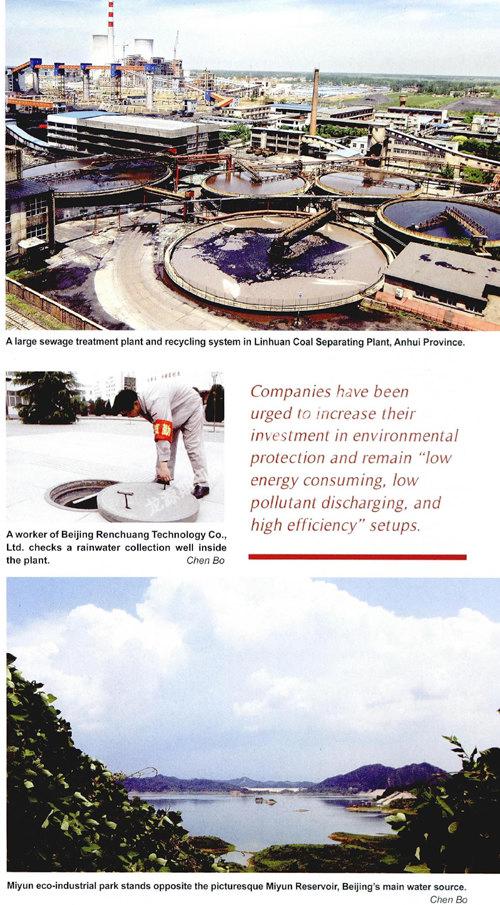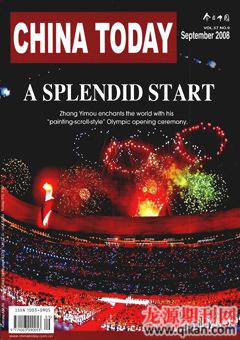Saving Energy in the Miyun Ecological Industrial Park
LIU QIONG
IN the courtyard of Beijing Renchuang Technology Co., Ltd. the ground is covered with colorful water-permeable bricks — the same bricks that have been used in Olympic venues such as the “Birds Nest,” “the Water Cube” and Shunyi Olympic Rowing-Canoeing Park. Renchuang is located in an eco-industrial park in Miyun County on Beijings outskirts. Office supervisor Yang Shihu explains, “Our company holds the patent on the ecological brick both in China and abroad. The permeated rainwater is used as a coolant on production lines, or for landscape irrigation.”
According to Yang, although Beijing lacks regular rain, the water collected via the permeable paving is enough to meet the entire factorys demand for water used in production. This is made possible not only by the bricks, but also an associated rainwater gathering and recycling system, involving over 200 meters of pipeline and three cisterns capable of holding 700 cubic meters of water. “These recycling measures can save up to 1,800 tons of water a month, and RMB 100,000 in water rates annually,” Yang claims proudly.

As construction in the Miyun Economic Development Zone has intensified, enterprises in the area have successively adopted a multitude of effective measures to save water. For instance, the Yili Groups Beijing Dairy Plant used to be a water guzzler. In 2007, the plant invested RMB 50,000 in innovative technology to gather condensed water from the workshops. This is then used for washing the toilets and garbage rooms, reducing water charges by RMB 140,000 a year.
There are now three enterprises in the area equipped with rainwater collecting systems, saving some 40,000 tons of water annually. Many corporations have also updated their sprinkler irrigation systems, and the eco-industrial park has updated its cooling systems so that the condensed water is recycled, saving 160,000 tons of water annually.
A Goal of “Zero Discharge”
Miyun Reservoir, 90 kilometers from downtown Beijing, is the citys main water source. Consequently, the Miyun Economic Development Zone has always given top priority to the reservoirs environmental safety. Corporations in the eco-industrial park spare no effort in their recycling and control of water.
According to Shi Yuzhu, deputy general manager of the Miyun Economic Development Zone, heavily polluting enterprises are strictly prohibited, and rigorous environmental protection standards exist for corporations inside the zone. Companies have been urged to increase their investment in environmental protection and remain “low energy consuming, low pollutant discharging, and high efficiency” setups.

This year the zone will invest more than RMB 100 million in transforming the pollution discharge system and sewage treatment plant, with the aim of achieving “zero discharge” of pollutants. Once reconstruction of the sewage plant is complete, the processed water will be good enough to provide irrigation for Beijings greenbelts.
The diverse energy-saving measures bring economic as well as environmental benefits. By the end of 2007, the 105 enterprises in the zone had achieved a production value of RMB 10.1 billion, an increase of 24 percent over 2006. In 2007 the comprehensive energy consumption of the zones industrial undertakings was 34,600 tons of standard coal, and 0.034 tons of standard coal consumed for every RMB 10,000 generated in the zone. This was a 28 percent drop in coal consumption compared to 2006, taking the zone far below the national average for coal use.

